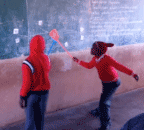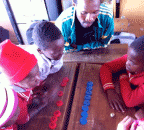

As an adjunct faculty member in the School of Education, I have had the privilege of working with adult learners from across the world that are making a difference in education. They’re searching for and engaging in ways to improve access to and the quality of education. They’re researching and introducing new practices in their classrooms to improve teaching and learning. They’re developing effective solutions to chronic problems in the US and in other countries. Chrysalis Project South Africa (CPZA) is on a similar journey with its mission to provide education, training, and coaching support to rural disadvantaged children and young adults in rural KwaZulu-Natal, South Africa.
I have been privileged to volunteer for CPZA and support the vision of my former neighbors, Corinne and Nils Westphal, who moved to South Africa to set up this organization and its affiliated farm. Within only one year of operations, they have already provided educational services to 250 kids and adolescents and 5 teachers, as well as ad-hoc support to 10 orphans. Their latest initiative, which began in September, is job search training for young adults. Fifteen young adults are currently benefitting from this program. This summer, I applied my skills in teaching and knowledge of international education to contribute to the development of an after-school learning program, catering to 5- to 11-year-olds.
The Challenges
Rural-based South African children and young adults are isolated from resources that we take for granted, such as basic infrastructure for sanitation, water, roads, electricity, and information and communication technologies. Kids walk miles back and forth to school every day. All live in poverty. Some are orphans, having lost both their parents to AIDS. If they are living with HIV/AIDS themselves, there is little hope for adoption. At home, children are often the caretakers of their younger siblings and running the households, as parents are forced to find work elsewhere to support their families. Schools function as important centers for the community, providing the single hot meal in a day for some children, providing daytime shelter and a safe haven, and delivering life‐saving lessons about health. Yet, teachers are very often untrained. And teacher absenteeism (10.3% in KwaZulu-Natal) compromises educational quality. Language diversity is also an issue in the region, as the learners and teachers, who are native Zulu speakers, must use English as the language of instruction to deliver the require school curriculum. They are also using outdated and imported textbooks, featuring images of things they are unlikely to ever encounter in South Africa. Books and school supplies are luxury items. Investment in a school uniform is a required expense to start school, which can cost the equivalent of several weeks of wages. Choice, even between different colors of crayons, is a novel concept. As Corinne put it, “The more I work with these kids, the more I realize that learning how to learn, and learning how live start with simple, essential notions … like having the right of choice.”
The Work
The after-school learning program was designed to help children develop the five key foundation skills they need to be successful at school and in life – cognitive skills, verbal/language skills, fine and gross motor skills, socio-emotional skills, and sensory skills. At the same time, the activities help to reinforce lessons learned in school, including vocabulary, literacy and numeracy. The activities are based on principles of learner-centered teaching and pedagogy, which is relatively new to South Africa. As such, the activities can be used and delivered by teachers from all skill levels and backgrounds. Hands-on teacher training serves to control quality.
Another key aspect of the Chrysalis Project’s after-school program is FUN. Through the interactive and “active” activities we developed, children are learning that learning can be fun and engaging. Additionally, they are learning to create things – from simple items like paper airplanes that they can use to compete with others in a “flying contest”, to more complex and elaborate sock puppets that they might use to narrate the stories they’ve made up themselves. Through creation of any of the above the children learn that THEY can create and THEY have “power.”
The Future
Based on the work this summer with the kids, CPZA has been approached to expand the after school program to other schools in the region, and fundraising will be part of the work that I will continue to do with CPZA. As American citizens, Corinne and I started discussing the inevitable question – what lessons did we learn that we could apply back at home in the US? Thus, the foundation for international work in education is being built – expansion within South Africa and the development of workshops to help learners, especially young ESL students, back at home in the US.
To learn more about CPZA:
www.facebook.com/ChrysalisProjectSouthAfrica
http://chrysalis-project-za.org/
corinne@chrysalis-project-za.org


A game with dice and milk tops help children practice their math